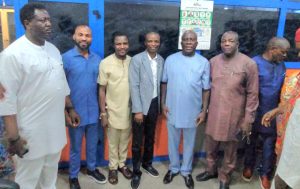EDITORIAL: Customs Abandonment of Clearing Agents Training, A Wake Up Call for Adeniyi

Customs Comptroller General, Wale Adeniyi
The Nigeria Customs Service in the past eight years have been churning out hundreds of officers from it’s training colleges, even it’s senior officers on the job have also undergone series of refresher courses to bring them at par with other customs administrations across the world.
Recently, the service graduated 50 from its Command and Staff College Gwagwalada, after undergoing rigorous training of Senior Course 8, which lasted for six months.
Apart from this, 300 cadets graduated from the Nigeria Customs Training College Ikeja, while 335 recruits passed out from Kano.
These young officers are passing out from the various command schools and coming into full operational practice with innovative ideas, all geared towards revenue generation.
But the facilitators of the federal government revenue, which is the licensed customs agents are not being provided with up to date training to bring them at par with their customs counterparts. This should be a cause for worry for the new Comptroller General of Customs, Wale Adeniyi if he wants to achieve compliance.
The last time a major training for Licensed Customs Agents was carried out by the Nigeria Customs Service was nine years ago, precisely September 2014 during the administration of Compt Abdulahi Inde Dikko.
The service in partnership with Prince Olayiwola Shittu as the President of Association of Nigerian Licensed Customs Agents (ANLCA) then, proceeded to train the customs agents in two batches at the training college in Ikeja, Lagos.
Today, the training of clearing agents by customs have stopped. What customs has resorted to is sensitization of few hours, the highest being 1-day sensitization tied to particular policy introduction in order to ensure compliance.
The pertinent question here is; these officers which the customs service just trained from Ikeja, Gwadalada and Kano, who are they coming to interface with? how well are clearing agents prepared at remaining on the same page?
The dichotomy in training in terms of duration, content and scope does not appear to match same expectations, and therefore capable of creating mixing links.
The officers know where the loopholes are, especially in the implementation of the new amendment of the Customs and Excise Management Act (CEMA), but many agents do not have this knowledge.
The customs officers would be waiting for agents to make mistakes due to outdated applications and to pounce on them. The clearing agents would now be forced to make a bribe offer for officers to apply discretion. All these would promote corruption and bribery.
In order to tackle the imbalance, the newly appointed Comptroller General of Customs, Compt Wale Adeniyi must swing into action by organizing catch-up training programs for licensed Customs Agents to bring them at par with Customs Officers.
The training would also address complaints by agents of being treated unfairly and losing money unnecessarily to Custom officials following Implementing of the amended CEMA Act.
Training of licensed customs agents cannot and should not be left in the hands of the freight forwarding associations or the Council for the Regulation of Freight Forwarding in Nigeria (CRFFN) alone. The CRFFN is regulated by Ministry of Transportation, while the Customs is under the Finance Ministry.
Customs is the implementer of the CEMA Act and every other government Policy which affects the nation’s economy. Hence, the training of the clearing agents as critical stakeholders must be handled by customs while other sundry aspects of the freight forwarding job can be left for CRFFN and the Associations.
The CRFFN by virtue of it’s Act 2007, is expected to regulate, train freight forwarders and give them value. But today, the reverse is the case. The Council is not going in that direction, rather, it’s trainings are now for the highest bidders and for the super rich.
It is safe to conclude that CRFFN training and certification has added little or no value to the clearing profession.
In the past, while carrying out such trainings for clearing agents, the Customs Service shop for professionals from the oversea, US mostly, who conduct these trainings, with training equipments shipped over from the United States so that the trainees will get the best and the most recent information on how to run their activities at the port in line with World Customs Organization (WCO)
Certificates issued at the end of such trainings would be a thing of honour and pride to the licensed agents, they are often regarded as “Customs Officers without Uniforms”
There is a lot of task before the new customs CGC Wale Adeniyi, one of which is that customs is moving into a new era with the recent signing of the N142.24billion customs modernization project.
Another cause for concern is a recent proposal that the Customs should be merged with Federal Inland Revenue Service (FIRS) and the Nigerian Maritime Administration and Safety Agency (NIMASA)
We believe what is required to drive efficiency is for customs officers to be trained and retrained regularly, together with it’s critical partners, the licensed agents.
The shared knowledge and mutual affinity will improve future operations and engagements, which will also put the customs agents at an advantage to query fiscal policies that indirectly puts the customs in a tight corner.
It is common knowledge that as public servant, the customs is quite unable to express divergent opinions at policies churched out by some copy cat policy formulators even when it’s not favourable to trade and the system.





